- Home
- Anthony Trollope
The Warden
The Warden Read online
THE WARDEN
ANTHONY TROLLOPE was born in London in 1815 and died in 1882. His father was a barrister who went bankrupt and the family was maintained by his mother, Frances, who resourcefully in later life became a bestselling writer. He received little education and his childhood generally seems to have been an unhappy one.
Happily established in a successful career in the Post Office (from which he retired in 1867), Trollope’s first novel was published in 1847. He went on to write over forty novels as well as short stories, and enjoyed considerable acclaim as a novelist during his lifetime. The idea for The Warden (1855), the first of his novels to achieve success, was conceived while he wandered around Salisbury Cathedral one mid-summer evening. It was succeeded by other ‘Barsetshire’ novels employing the same characters including Archdeacon Grantly, the worldly cleric, the immortal Mrs Proudie and the saintly warden, Septimus Harding. These novels are Barchester Towers (1857), Doctor Thorne (1858), Framley Parsonage (1861), The Small House at Allington (1864) and The Last Chronicle of Barset (1867). This series is regarded by many as Trollope’s masterpiece, in which he demonstrates his imaginative grasp of the great preoccupation of eighteenth- and nineteenth-century English novels – property. Almost equally popular were the six brilliant Palliser novels comprising Can You Forgive Her? (1865), Phineas Finn (1869), The Eustace Diamonds (1873), Phineas Redux (1874), The Prime Minister (1876) and The Duke’s Children (1880). The notable titles among his many other novels and books include He Knew He Was Right (1868–9), The Way We Live Now (1874–5), An Autobiography (1875–6) and Dr Wortle’s School (1881).
ROBIN GILMOUR was Reader in English at the University of Aberdeen. He was the author of The Idea of the Gentleman in the Victorian Novel (1981), The Novel in the Victorian Age: A Modern Introduction (1986) and The Victorian Age: The Intellectual and Cultural Context of English Literature 1830–1890 (1993). He also edited Trollope’s Barchester Towers for Penguin Classics. He died in 1999.
ANTHONY TROLLOPE
The Warden
Edited with an Introduction and Notes by ROBIN GILMOUR
PENGUIN BOOKS
PENGUIN BOOKS
Published by the Penguin Group
Penguin Books Ltd, 80 Strand, London WC2R 0RL, England
Penguin Group (USA), Inc., 375 Hudson Street. New York, New York 10014. USA
Penguin Books Australia Ltd, 250 Camberwell Road, Camberwell, Victoria 3124, Australia
Penguin Books Canada Ltd. 10 Alcorn Avenue, Toronto, Ontario, Canada M4V 3B2
Penguin Books India (P) Ltd. 11 Community Centre, Panchsheel Park, New Delhi – 110 017. India
Penguin Books (NZ) Ltd, Cnr Rosedale and Airborne Roads, Albany, Auckland, New Zealand
Penguin Books (South Africa) (Pty) Ltd, 24 Sturdee Avenue, Rosebank 2196. South Africa
Penguin Books Ltd. Registered Offices: 80 Strand, London WC2R 0RL. England
www.penguin.com
First published 1855
Published in Penguin Books 1982
Reprinted in Penguin English Library 1984
Reprinted in Penguin Classics 1986
Reprinted with a revised Further Reading and a new Chronology 2004
29
Introduction and Notes © Robin Gilmour, 1984, 2004
All rights reserved
Except in the United States of America, this book is sold subject
to the condition that it shall not, by way of trade or otherwise, be lent,
re-sold, hired out, or otherwise circulated without the publisher’s
prior consent in any form of binding or cover other than that in
which it is published and without a similar condition including this
condition being imposed on the subsequent purchaser
EISBN: 978–0–141–90810–6
Contents
INTRODUCTION
A NOTE ON THE TEXT
FURTHER READING
CHRONOLOGY
THE WARDEN
NOTES
Introduction
(New readers are advised that this Introduction makes the detail of the plot explicit.)
The Warden (1855), Trollope’s fourth novel and the first of the Barsetshire Chronicles, is in outline a simple tale: the story of an elderly clergyman, warden of an almshouse for old men, who resigns this Church sinecure when it becomes the centre of public controversy. Trollope’s account of the book’s origin in his Autobiography (1883) is almost as simple. He was working for the Post Office, and in 1851 had been sent to examine rural deliveries in the West of England:
In the course of this job I visited Salisbury, and whilst wandering there on a mid-summer evening round the purlieus of the cathedral I conceived the story of The Warden – from whence came that series of novels of which Barchester, with its bishops, deans, and archdeacon, was the central site. (Chapter 5)
It is a famous passage, one that seems to breathe the air of clerical tranquillity which generations of readers have found in Barchester. Trollope goes on, however, to disclaim any previous knowledge of clerical and cathedral life:
I have often been asked in what period of my early life I had lived so long in a cathedral city as to have become intimate with the ways of a Close. I never lived in any cathedral city – except London, never knew anything of any Close, and at that time had enjoyed no peculiar intimacy with any clergyman. My archdeacon… was, I think, the simple result of an effort of my moral consciousness. (Chapter 5)
This statement is slightly misleading. No doubt Trollope did conceive Archdeacon Grantly and his other characters in his ‘moral consciousness’, but he forgot to mention that he had also lived for three years in a cathedral town: he had been a schoolboy at Winchester. At the end of his life he remembered more clearly, telling his friend E. A. Freeman that ‘Barchester was Winchester, where he was at school, and the notion of Hiram’s Hospital was taken from Saint Cross’.1
Speculating about the original of Barchester is a harmless pastime, and in the end it does not greatly matter whether the most famous cathedral town in English fiction is Salisbury or Winchester or, as Trollope suggests at the start of The Warden, an amalgam of these and others. What is of interest to the reader of Trollope is the link that undoubtedly exists between his first successful novel and his unhappy childhood. The Warden is one of the shortest and most topical of his books, but it had a longer genesis than any other. A year after visiting Salisbury he wrote the first chapter, then laid it aside, resumed it at the end of 1852, and finished the work, according to the Autobiography, ‘in the autumn of 1853’ (Chapter 5). But Trollope was notoriously inaccurate about dates and figures (there is a spectacular error in the first chapter of The Warden) and it is much more likely that the writing extended well into 1854, for the manuscript was sent to Longman, who had earlier agreed to look at it, in October 1854. A novel so long in the making was inevitaoly fed from many sources: the visit to Salisbury in 1851, the clerical scandals of the day and, as we shall see, the role of The Times in attacking them, but also the sufferings of Trollope’s childhood. If the story of Mr Harding is the first truly characteristic manifestation of Trollope’s genius, it is so partly because it enabled him to express a vision of the world which had deep roots in his own life and experience.
I
Trollope was born in 1815, the fourth son of a moody and impecunious Chancery barrister and of Frances Trollope, who was subsequently to save the family from financial ruin by her late-blooming career as a travel-writer and popular novelist. His father had expectations of inheriting an uncle’s family estate, on the strength of which he committed himself beyond his means to embark on a disastrous career as a gentleman-farmer. When the childless uncle married again and started producing heirs, the Trollope family was set
on an inexorable downward path into genteel poverty. The story of Anthony’s hapless involvement in his father’s decline is poignantly told in the first chapter of his Autobiography. An increasingly neglected, dirty and penniless child, he was sent first to nearby Harrow School as a day boy, then to a private school at Sunbury, then (with a half-hearted idea that he should go on to New College, Oxford) to Winchester, where, his bills unpaid and his pocket-money stopped, he became a ‘Pariah’: ‘I was big, and awkward, and ugly, and, I have no doubt, skulked about in a most unattractive manner. Of course I was ill-dressed and dirty. But, ah! how well I remember all the agonies of my young heart; how I considered whether I should always be alone; whether I could not find my way up to the top of that college tower, and from thence put an end to everything?’ Worse was to come. With his mother in America trying to recoup the family fortunes, and his father sunk in gloom in a tumbledown farmhouse compiling – of all things – an ecclesiastical encyclopaedia, Trollope was sent back to Harrow as a day boy, forced to walk twelve miles a day on dirty lanes to and from the school. It was, he says, the worst period of his life:
I was a sizar [poor student] at a fashionable school, a condition never premeditated. What right had a wretched farmer’s boy, reeking from a dunghill, to sit next to the sons of peers – or much worse still, next to the sons of big tradesmen who had made their ten thousand a-year? The indignities I endured are not to be described. As I look back it seems to me that all hands were turned against me – those of masters as well as boys… I was never able to overcome… the absolute isolation of my school position. Of the cricket-ground or racket-court I was allowed to know nothing. And yet I longed for these things with an exceeding longing. I coveted popularity with a coveting which was almost mean. It seemed to me that there would be an Elysium in the intimacy of those very boys whom I was bound to hate because they hated me. Something of the disgrace of my schooldays has clung to me all through life.
Writers, perhaps more than other people, are prone to exaggerate the sufferings of their childhood; that Trollope did not do so is evident from the testimony of Sir William Gregory, husband of Lady Gregory of Coole Park, who was a contemporary at Harrow and later a friend, and who wrote of Trollope in his autobiography that he was ‘without exception the most slovenly and dirty boy I ever met… He gave no sign of promise whatsoever, was always in the lowest part of the form, and was regarded by masters and by boys as an incorrigible dunce.’2
Ever since Edmund Wilson’s essay on Dickens in The Wound and the Bow (1941), critics have made much of Dickens’s passionate resentment of the months he spent in the blacking-factory as a child. One sometimes wonders, though, whether Trollope did not suffer more in absolute terms from his prolonged experience of lost caste, but since he wrote no Bildungsroman like David Copperfield or Great Expectations the influence of the experience can be sensed only indirectly in his fiction, as for example in the remarkable description of the sufferings of ‘poor gentry’ in Chapter 9 of The Last Chronicle of Barset (1867). Certainly he responded to it very differently. If the blacking-factory and the debtors’ prison made Dickens a rebel and a social reformer, the humiliations of Harrow and Winchester made Trollope, in part of himself, a passionate conformist, hungry for social acceptance. The man who could write of his ‘exceeding longing’ to join in cricket and rackets, of the ‘Elysium’ of being able to make friends with his contemporaries on a basis of equality, was no disdainful aesthete, and the story of his life is – from one point of view – the story of someone who had lost caste in his youth making his way slowly back into the Elysium of gentlemen. Nothing illustrates this ambition better than the efforts that this ‘incorrigible dunce’ made to teach himself Latin in adult life, thereby redeeming the schoolboy’s failure to acquire the classical learning that was the hallmark of the gentleman. (There is something of the same impulse at work in the touchingly modest claim at the end of the Autobiography not ‘to any literary excellence’ but ‘to whatever merit should be accorded to me for persevering diligence in my profession’ in writing forty-seven novels.) Hence the gregarious, fox-hunting figure who emerges from contemporary recollections of Trollope: the conscientious civil servant and part-time author, frequenter of clubs and rider to hounds, with his high colour, loud laugh, boisterous spirits and gesticulating manner – almost as if he were trying to live up to his idea of the hearty English squire. Hence, too, the no-nonsense portrait of the artist in the Autobiography, where aspiring writers are advised to stick to their desks ‘as though they were lawyer’s clerks’ and the legendary Trollope routine was posthumously revealed: at the desk by 5.30 a.m., three hours writing at 250 words every quarter of an hour by the clock, ten pages a day – a rate, he reckoned, which would have enabled him to complete three three-volume novels a year, if the market could have stood it – then off to the Post Office for a day’s work.
‘One hates an author that’s all author,’ the aristocratic Byron wrote in Beppo, preferring those writers ‘Who think of something else besides the pen’. It was part of Trollope’s complex relationship to the gentlemanly code that he should have played down the element of inspiration and creative genius in his work, spoken of his gift as though it were on a par with any other trade a man might ply to earn money. His misfortune was to be taken at face value. The Samuel Smilesian note on which the Autobiography ends, with its careful balance-sheet of literary earnings, obscured the suffering outsider of the first chapter and was used to confirm the view of Trollope which had gained ground in his own lifetime: that he was a conventional writer, an unspectacular recorder of the everyday, in Carlyle’s harsh words ‘irredeemably imbedded in commonplace, and grown fat upon it’.3 Or as Henry James put it, more sympathetically: ‘His great, his inestimable merit was a complete appreciation of the usual.’4 Yet if we look at Trollope’s life and work from the perspective of the Autobiography’s opening pages, two quite unusual features are thrown into relief. One, which may at first seem obvious enough, is that the young ‘Pariah’ of Harrow and Winchester was an outsider, looking on at the world of his more secure contemporaries with, as he says, ‘an exceeding longing’. The hunger for social acceptance which can be sensed in Trollope’s life had an aesthetic corollary in his novelistic fascination with the rituals of the English middle-class and gentry life from which he had once been excluded. The English are said to have a genius for institutions, and in Trollope they have a novelist who is the supreme recorder of that genius. The Church, the Civil Service, Parliament, the Law, the rural gentry – Trollope was the first novelist to map the subtle interrelations of these various institutions in Victorian England. It has been, and still is, far too easy to underestimate the sheer knowledge of human nature in its social and institutional bearings which went to the creation of the Barsetshire and Palliser novels, and perhaps it took a writer with something of an outsider’s fascination to conceive them in the first place.
The other unusual feature in Trollope’s case may seem the very opposite of this: it is his feeling for, and invariably sympathetic portrayal of, the lonely individual, the character caught in a moment of isolation and introspection, like Mr Harding in the chapter ‘A Long Day in London’. Nearly all Trollope’s unhappy characters are portrayed with a wonderfully precise sympathy, even – or especially – the exiles and misfits, those who for whatever reason have stepped beyond the accepted boundaries of their caste or social group. One thinks of the Rev. Josiah Crawley, the perpetual curate accused of stealing a cheque in The Last Chronicle of Barset, or the melancholy, obsessed Trevelyan in He Knew He Was Right (1869), or the swindler Melmotte in The Way We Live Now (1875), denounced as a scoundrel for much of the novel but, after his downfall, the object of Trollope’s increasingly compassionate scrutiny. In other words, one cannot read far in Trollope’s work without encountering what David Skilton has called ‘a central paradox’: ‘that of all novels they are the most “social”, in the sense of depending on the interaction of sets of persons, and of creating a sup
remely convincing illusion of a functioning fictional community; and yet that an examination of any of the novels will show how very significant a proportion of the book concerns the situation of a single character, alone…’5 Just as contemporaries found in Trollope the man a sensitive nature and feeling heart beneath the bluff, gregarious manner, so the reader of his novels soon becomes accustomed to moving from the comic outer action of the densely realized community to the inner action of the solitary individual.
The significance of The Warden in Trollope’s career is that it was the first of his novels to bring these twin impulses fully into play. Here one can see the beginning of his inquiry into the Church as an institution, and in Archdeacon Grantly the first stirrings of the comedy that lies in the contrast between the worldly man and the unworldly calling, both to be much more fully developed in Barchester Towers (1857). Also evident is Trollope’s preoccupation with the influence of London and metropolitan opinion on provincial life. But at the heart of the novel is a private drama of conscience and an act of resignation. The co-presence of these two perspectives, the interaction and indeed collision between them, gives The Warden a resonance out of proportion to its modest scale. For of course the relation between private and public life, and more particularly the threat to the individual posed by the growth of public opinion and the advent of a centralized modern democracy, are among the chief concerns of Victorian literature. When Mr Harding wonders how he can ever tell the truths of ‘his inmost heart’ (p. 60) to the readers of the Jupiter, Trollope is touching on an issue which animates works so different from The Warden as Arnold’s poem ‘The Buried Life’ or Tennyson’s In Memoriam, with its troubled vision of ‘private sorrow’s barren song’ drowned in the march of science and democracy (lyric xxi). Moreover, by dramatizing the issue in terms of an individual caught in the limelight of newspaper publicity Trollope was giving it an original and highly topical treatment. It is to this question of the novel’s topicality I want now to turn.

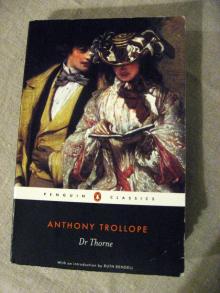 Doctor Thorne
Doctor Thorne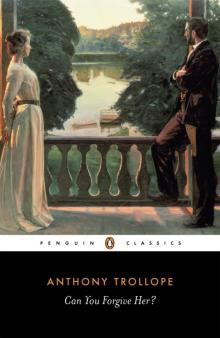 Can You Forgive Her?
Can You Forgive Her?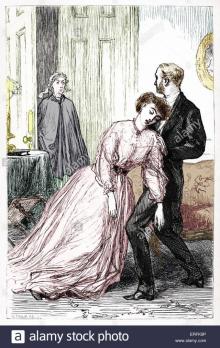 The Last Chronicle of Barset
The Last Chronicle of Barset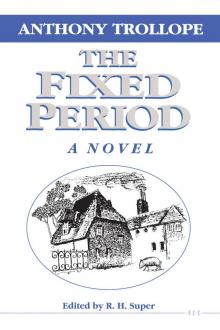 The Fixed Period
The Fixed Period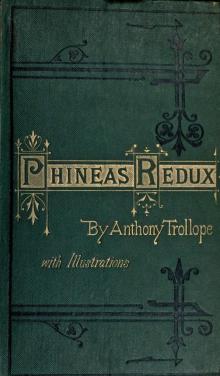 Phineas Redux
Phineas Redux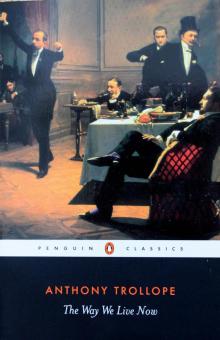 The Way We Live Now
The Way We Live Now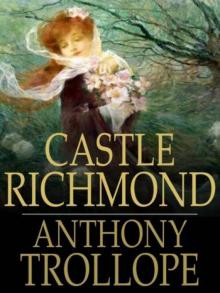 Castle Richmond
Castle Richmond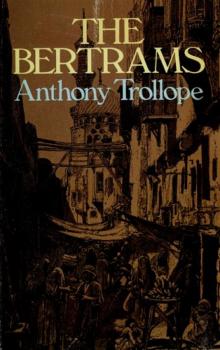 The Bertrams
The Bertrams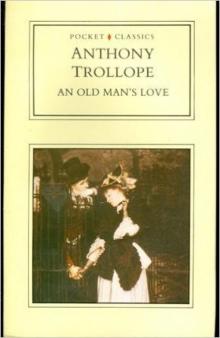 An Old Man's Love
An Old Man's Love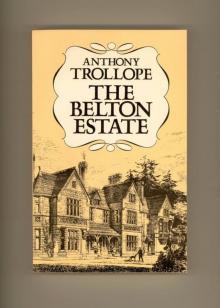 The Belton Estate
The Belton Estate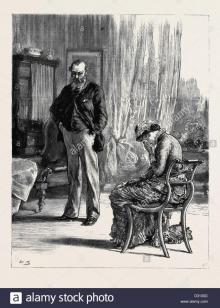 Marion Fay: A Novel
Marion Fay: A Novel The Claverings
The Claverings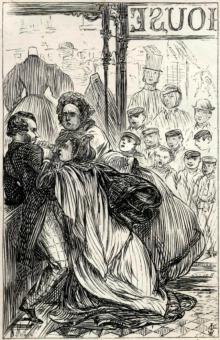 The Struggles of Brown, Jones, and Robinson
The Struggles of Brown, Jones, and Robinson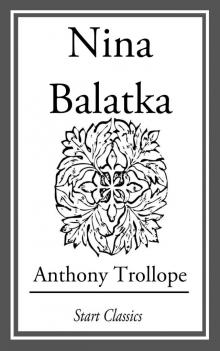 Nina Balatka
Nina Balatka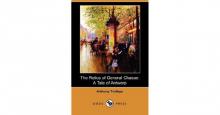 The Relics of General Chasse: A Tale of Antwerp
The Relics of General Chasse: A Tale of Antwerp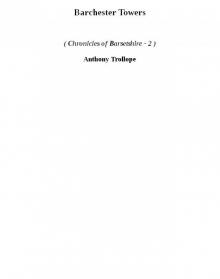 Barchester Towers cob-2
Barchester Towers cob-2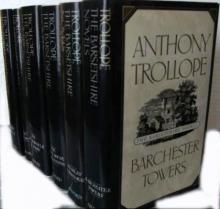 The Chronicles of Barsetshire
The Chronicles of Barsetshire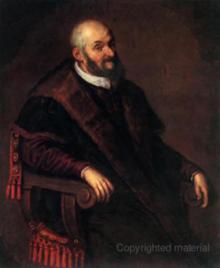 The Warden cob-1
The Warden cob-1 Framley Parsonage
Framley Parsonage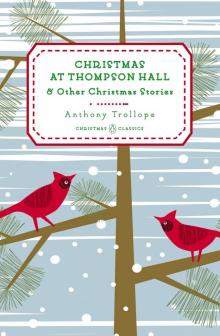 Christmas at Thompson Hall
Christmas at Thompson Hall The Warden
The Warden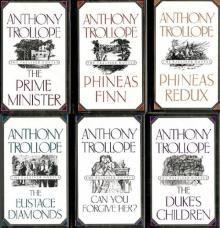 The Palliser Novels
The Palliser Novels The Small House at Allington
The Small House at Allington Barchester Towers
Barchester Towers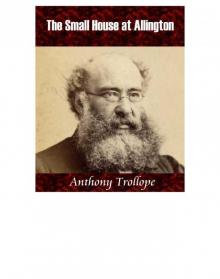 The Small House at Allington cob-5
The Small House at Allington cob-5 The Duke's Children
The Duke's Children Phineas Finn, the Irish Member
Phineas Finn, the Irish Member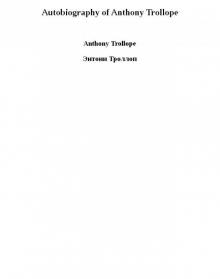 Autobiography of Anthony Trollope
Autobiography of Anthony Trollope